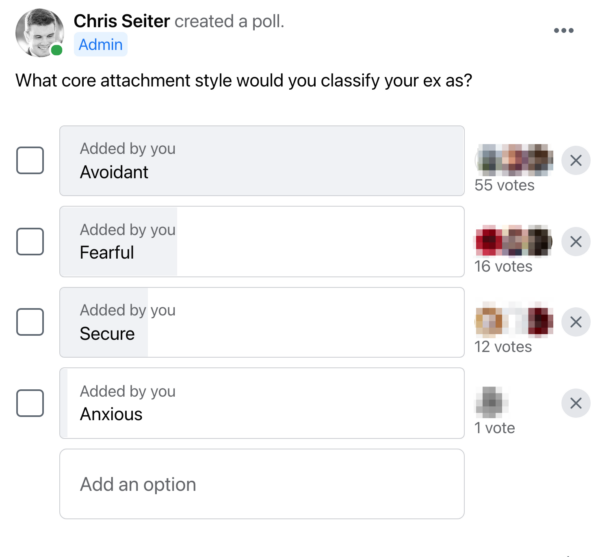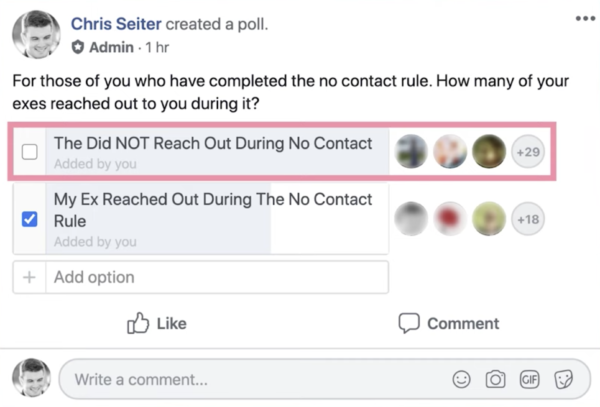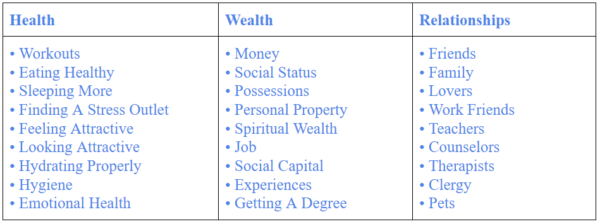Today I’m going to reveal 8 simple truths about going through a first love breakup.
In fact:
These same truths can be universal for anyone going through a breakup but I did my best to focus on the big concepts that most people misunderstand when they go through their very first breakup.
And believe me when I say that there are some serious misconceptions out there.
Let’s dive right in.
- Our Research Indicates You Are Probably Anxious While Your Ex Is Avoidant
- No Matter Your Intentions No Contact Is A Good Idea
- Contrary To What You Might Believe Going On Dates Is A Good Idea
- Don’t Get Wrapped Up In Who Contacts Who First
- Your Time Management Skills Are About To Be Tested
- The Impact Of “Show Don’t Tell” On Social Media
- Learn To Ask Why Instead of What
- If You Can’t Outgrow Your Ex You Probably Won’t Get Them Back

What Are Your Chances of Getting Your Ex Boyfriend Back?
Take the quizTruth #1: You Are Probably Anxious While Your Ex Is Avoidant
Our first truth revolves around attachment theory which is a topic that we’ve been talking about a lot on this website.
Generally speaking there are four attachment styles,
- Secure: Comfortable with intimacy, confident. Great at setting boundaries and sticking to them.
- Anxious: Puts too much of themselves into a relationship. Needs constant reassurance about their partners love and commitment
- Avoidant: Values their independence so highly that if someone threatens it they tend to leave.
- Fearful: A combination of both anxious and avoidant behaviors.
Now, the advantage that Ex Boyfriend Recovery can provide you is the fact that we have a lot of data. Specifically data on people going through breakups.
Here’s what we’ve found.
Our average client tends to be more susceptible to giving in to their anxious behaviors. This means that they will,
- Beg for their exes back
- Struggle deeply with a no contact rule
- Obsess about what their ex is doing
- Think they are the problem in the relationship (in most cases they aren’t)
- Constantly pester friends and family about the breakup
And what we know about people with anxious attachment behaviors is that it all stems from a core wound,
I’m afraid of being abandoned.
Is this starting to sound familiar?
Here’s the other mind blowing thing we’ve learned. Most likely your ex is an avoidant.

A few years ago we conducted a poll of people in our private facebook support group and learned that most of the exes of our participants tended to be avoidant. If you understand the dynamics between anxious and avoidant research this totally makes sense.
The School of Life did a great video essay on the dynamics in these types of relationships.
In essence they argue that anxious and avoidant attachments styles are naturally drawn together because,
- The avoidant goes through a phase where they seek love
- The anxious goes through a phase where they want to solve problems and provide love
But ultimately the two attachments styles grate on each others nerves and a breakup is inevitable.
Truth #2: No Matter Your Intentions The No Contact Rule Is A Good Idea
There are really two types of people who come to this website.
- Those who go through a breakup and look for a way to get their ex back
- Those who go through a breakup and look for a way to get over their ex
No matter what situation you find yourself in the path to salvation always starts with the no contact rule.
Our official definition of the no contact rule refers to a period of time where you cut off all conceivable communication with an ex after a breakup. The intent of this tactic should NOT be used to make your ex miss you but instead should be used to rebuild your own life so that you outgrow your ex. By doing this, the no contact rule can have the added benefit of making an ex miss you
The big thing with no contact is that it’s all about taking the focus off of your ex and putting the focus on you.
You can go elsewhere and read about the no contact rule and all it’s psychological benefits of how it can make an ex miss you (it can.) However, we’ve learned through studying it for close to a decade that if you go into the no contact rule with the wrong intentions you usually won’t get great results.
You see, the key is to take the focus off of your ex and put it onto yourself.
The no contact rule serves as a time out where you can allow that to happen. Of course, every single day our clients miss the point of the no contact rule because their anxious tendencies get the better of them.
Which is why I’ve been trying out a new component to the no contact rule.
Officially there are three time frames to a no contact rule,
- The 21 day rule
- The 30 day rule
- The 45 day rule
We’ve been finding that longer versions of no contact tend to be yielding positive results. Not too long, mind you but around that 45 day mark. When you look at why that is it gives us some insight into what really needs to happen with no contact.
We think that people who have longer periods of no contact go through this emotional process where they quite literally outgrow their ex.
Off the record my theory is that you shouldn’t be reaching out to an ex until you’ve gotten to this place emotionally where you don’t want them back anymore. This gives you a best of both worlds situation.
Truth #3: Contrary To What You Might Believe Going On Dates Is Actually A Good Idea
When I say rebound relationship what’s your first thought?
Well, if you’re anything like me you’ll attach this negative stigma to rebound relationship but research and experience has told us a different story.
Take one of our success stories, Jamie Cantrell.
She decided that after her breakup she was going to go on as many dates with guys to just see what happened. What’s really interesting is that two things ended up occurring.
- Her ex asked for her back
- She got to this place emotionally where she didn’t want him back anymore
Could going on “the rebound” actually be a good thing?
According to an article posted in the Journal of Social and Personal Relationship,
New research shows rebound relationships are surprisingly healthy.
Recent evidence suggests, in fact, that people who dive into rebound relationships get over their ex-partner more quickly and feel more confident in their date-ability (Brumbaugh & Fraley, 2014).
And that’s exactly what we saw happen in the Jamie Cantrell situation above. I’d even take it a step further and say that “fear of loss” is an essential factor as well that I notice when I interview many of our success stories.
So, while you may go into this thinking that going on the rebound is a bad idea, well, think again.
Truth #4: Don’t Get Wrapped Up In Who Contacts Who First
Everyone always seems to put a pretty big emphasis on who is the first person to contact who after a breakup.
I think the thinking is,
If my ex contacts me first that means they miss me.
In the grand scheme it doesn’t matter. What matters more is,
The quality of the conversation and who ends the conversation.
To prove this point I’d like to turn your attention to the no contact rule which is supposed to be this super psychological tactic you can use to make a reach out to you first. After all, it employs “psychological reactance” which basically states,
When a perceived freedom is becoming threatened you are likely to react in a way to get that freedom back.
So, the no contact rule is supposed to make your ex want to reach out first. You’re taking their freedom to talk to you away, right?
Well, the research tells us something different.

We surveyed close to 50 people who used the no contact rule on their exes and asked them if their exes reached out to them.
- 62% of participants said their exes did NOT reach out first
- 38% of participants said their ex did reach out first
Yet despite this fact we were able to see high success rates in “breakup recovery.”
Why?
Because we drilled it into our clients heads that what matters more when trying to get an ex back is not who starts the conversation but who ends it.
Truth #5: Your Time Management Skills (And Discipline) Are About To Be Tested
If you were to ask me today what I think the most important “skill” that you’ll need to “recover” from a breakup is time management.
Specifically as it related to our holy trinity concept.

The holy trinity is a concept I came up with to help people put some order back into their lives. The way it works is comically simple and yet I find most people fail to properly balance it.
Divide your life up into three categories,
- Health
- Wealth
- Relationships (outside of your ex)
Your main goal is to find a balance between all three. The challenge is that while you may initially think this is easy it’s really not.
There are 24 hours in a day.
- But you sleep for 8 hours.
- You probably goof off for another 4 or 5 hours.
- You work or go to school for around another 8 hours.
- This leaves you four hours to eat, drive or do whatever else you do throughout the day.
Really what I see in that list above is a schedule heavily invested into “wealth” but a little lacking in the other areas.
To add another layer of complexity there might not be enough time in a day to “hit on” all three levels of the trinity.
And to add even another layer of complexity your actions are not created equal.
I’ll use myself as an example.
I spent most of the day yesterday focused on wealth and relationships.
My health suffered because even though I’ve been trying to eat more plant based I decided to undo that work because I got a craving for ice cream. So, what little actions I had set aside to improve health suffered.
Not to mention the fact that I only dedicated enough time to improve “wealth” and “relationships” yesterday. I didn’t do much for health.
You’ll find this is often the case when you divide your life up into this way. You have to make executive decisions that prevent you from achieving a balance which is why I say your time management skills are about to be tested.
Truth #6: The Impact Of “Show Don’t Tell”
My wife and I have been watching Survivor at night lately and I find myself fascinated at the dynamics of it.
The game is truly a game of deceit but I’ve noticed the best contestants have this concept of “show, don’t tell” down.
Whenever they pull out a big move they don’t go telling everyone about it. They simply blindside another contestant and survive to live another day. The worst players of Survivor in my opinion are the people who need to take credit for something and so they blab and blab.
They “tell” instead of “show.”
The same can be said about social media after a breakup. I’ll give you a live example. This was recently posted to on of our members Facebook accounts for the world to see,

While it’s technically insightful advice it’s not necessarily a great way of “showing” on social media. Instead what it is advertising that the breakup is bothering you which in turn gives your ex confidence that they are “winning” the breakup.
And if you’re sitting there and thinking,
“There’s no way my ex would be that petty.”
They can believe me.
Here’s what you want to do with social media.
SHOW off your progress with the holy trinity concept above. Don’t brag about it but quite literally show yourself in the midst of accomplishing your goals.
Truth #7: Learn To Ask Why Instead of What
Eventually you and your ex will talk.
It’s going to happen at some point. Now, I’ve talked in depth about the idea of getting to this place emotionally where you kind of don’t want them back anymore before you talk to them.
Getting to that place is of course important but that doesn’t mean I can’t let you in on some of the tricks of the trade.
Specifically how to create meaningful conversations.
In my view the biggest mistake that I see people making when they get back in touch is a failure to ask why and simply settle on a what.
Let’s pretend that you and I are having a conversation and you ask me,
Chris, what are some of your favorite movies?
To which I respond,
It’s a little hard to choose one but I love Interstellar, Benjamin Button, Forrest Gump, Rain Main, Arrival movies like that.
Most people when they reach this point of a conversation simply transition to something else. They fail to dig deeper.
They fail to ask why.
Imagine if instead of transitioning to a new topic you stay dug in on this conversation and and asked me why I love those movies. I would be forced to look inwards and show you something about myself.
Show you the soul underneath the body so to speak.
This is my best tip for you if you want to create desire within an ex.
Start asking why.
Truth #8: If You Can’t Outgrow Your Ex You Probably Won’t Get Them Back
I’ve talked about this concept a ton throughout this article so it shouldn’t come as a surprise to anyone.
If you aren’t able to outgrow your ex then you probably won’t get them back (assuming that’s what you want.)
But I think there’s a psychological component for why this is the case.
Above I went through the explanation of attachment styles.
- Secure
- Anxious
- Avoidant
- Fearful
I think the real reason “outgrowing your ex” works is that it’s all about adopting more secure tendencies and we know from research that all the insecure attachment styles have this draw towards secure attachment styles.
So quite literally by outgrowing your ex (which is a secure thing to do) you give yourself the best position to either,
- Get your ex back
- Get over your ex
The choice is up to you.
The post The Simple Truths About Going Through A First Love Breakup first appeared on Ex Boyfriend Recovery.